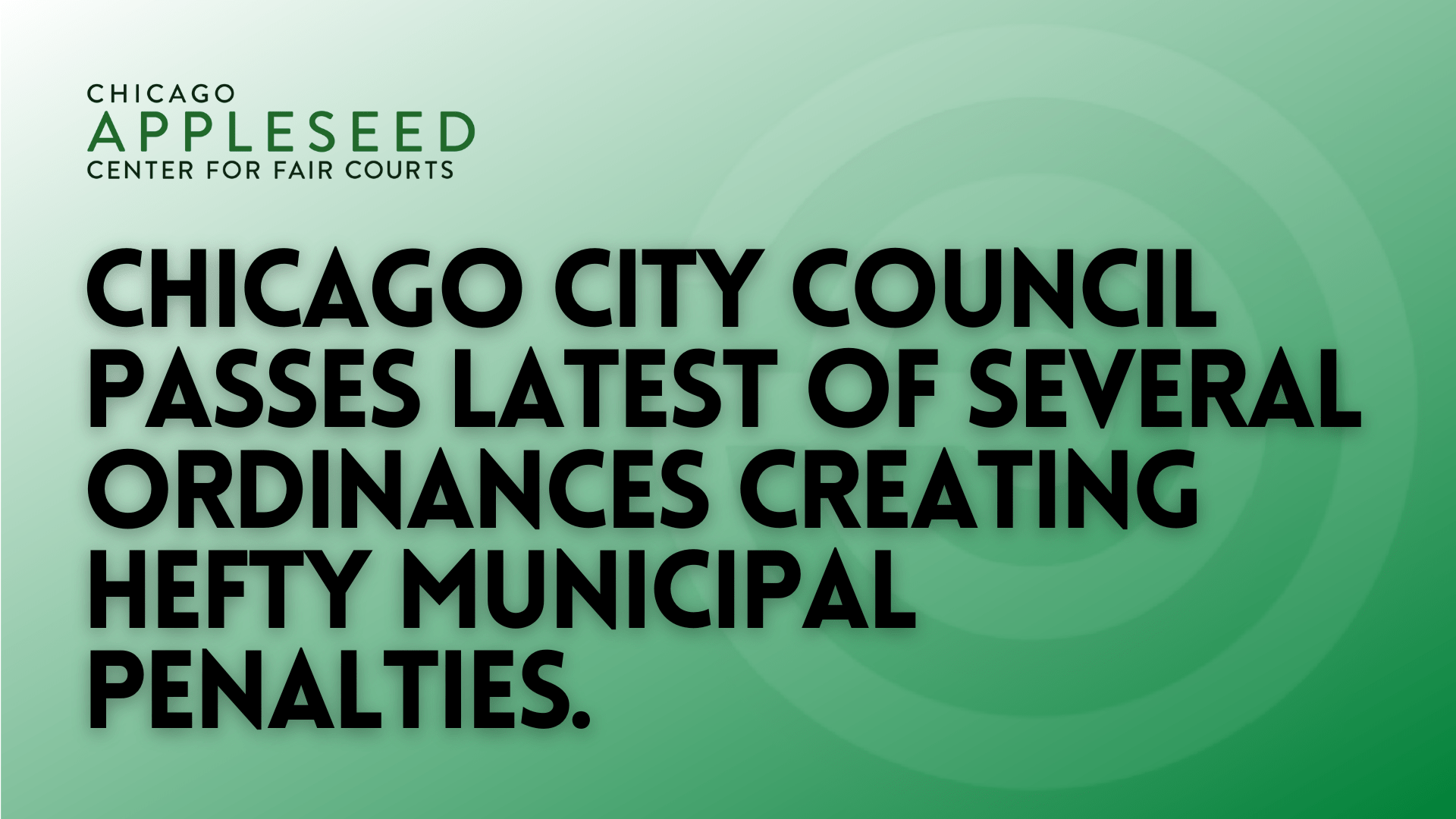Chicago City Council passes Ordinance (02023-904)—the latest of several policies aimed at creating hefty municipal penalties.
Today, an ordinance (02023-904) to create enhanced penalties for “aggravated assault” on emergency workers, firefighters, and police officers – introduced by Alderman Matt O’Shea – passed Chicago City Council. This ordinance is the latest in a series of ordinances aimed at creating hefty municipal penalties and a mandatory 3 months in jail for charges that already are prosecuted by the county courts.
These municipal penalties will provide no public benefit, and will penalize those most in need of support, not criminalization.
It’s important to understand what “aggravated assault” actually is. Assault is the crime of “knowingly engag[ing] in conduct which places another in reasonable apprehension of receiving a battery” (720 ILCS 5/12-1). It does not involve touching another person, and it does not involve injury—any physical contact of an “insulting or provoking nature” would make someone guilty of a battery (720 ILCS 5/12-3), not an assault. Assault can become aggravated assault when the victim is someone with a particular occupation, like a police officer, firefighter, or emergency worker. The alleged conduct of the accused person is no more serious than in a simple assault; the only thing different is the identity of the victim.
Assault is an incredibly broad charge, since, in its essence, it turns on when the person who is accusing someone of assault felt reasonable apprehension that they were going to be hit. To determine what kinds of incidents are giving rise to aggravated assault complaints, we looked at the crimes dataset published by the City of Chicago. It records all instances where a crime was reported to the Chicago Police Department. This dataset is particularly useful in this instance because it records whether a weapon was used and, if a weapon was not used, whether there was any injury in each reported aggravated assault. From 2019 to 2022, there were about 2,900 assaults that were aggravated due to the identity or employment of the victim. In about 2,000 of those cases – 70% – there was no weapon used and no injury. The assaults were marked as involving “hands” or “hands, fists, feet”.
Put differently, in 70% of reported aggravated assaults that would have been covered by this ordinance, the incident involved an unarmed person who never touched the first responder. These are not the kinds of incidents where harsh additional penalties should be applied.
More disturbingly, because the ordinance creates a new misdemeanor, and because the penalties go through city, not county, courts, charges under ordinance would bypass the Cook County State’s Attorney’s Office and allow police to file these charges directly, without a prosecutor reviewing whether they are appropriate or not. This ordinance is particularly concerning because aggravated assault charges can be closely associated with resisting arrest charges, which are often levied against protesters and those in mental health crises.
Protesters should be able to exercise their first amendment rights without fear that a police officer will be able to unilaterally file a charge that could levy a charge against them that could carry a mandatory jail sentence. And we should be responding to people in mental health crises with treatment, not further criminalization. We know that further criminalization of this kind does not deter criminal behavior. Creating a new city-level crime will not keep any first responders or community members any safer.
City Council creating new municipal crimes to increase penalties for non-violent conduct and bypass the judicial system creates terrible precedent. Chicagoans overwhelmingly approved an ordinance calling for “treatment not trauma” for those suffering from mental illness. Our City Council should be focusing on solutions to violence that involve reinvestment in communities, appropriate treatment for people with mental health and substance use issues, and addressing police violence and misconduct.
This ordinance is bad policy that will not keep first responders safe and that will further criminalize marginalized Chicagoans.
It is imperative that the City provide transparent and accountable data collection on how this ordinance is being used, who has been charged, how often, and in what circumstances. Unfortunately, data on misdemeanors is usually not easily accessible to the public. If the city council is going to create new misdemeanors, there should be proactive information sharing about when and how the city is using these enhanced criminal penalties.
During the city council meeting, Aldermen O’Shea and Alderman Carlos Rosa made a commitment to meet with Chicago Appleseed Center for Fair Courts, the Cook County Public Defender’s Office, the National Alliance on Mental Illness (NAMI), and other organizations who had expressed concern about this ordinance to ensure that it will not have “unintended consequences.” We look forward to this meeting and a continued dialogue about the implementation of this ordinance to carefully monitor how it is being used.

